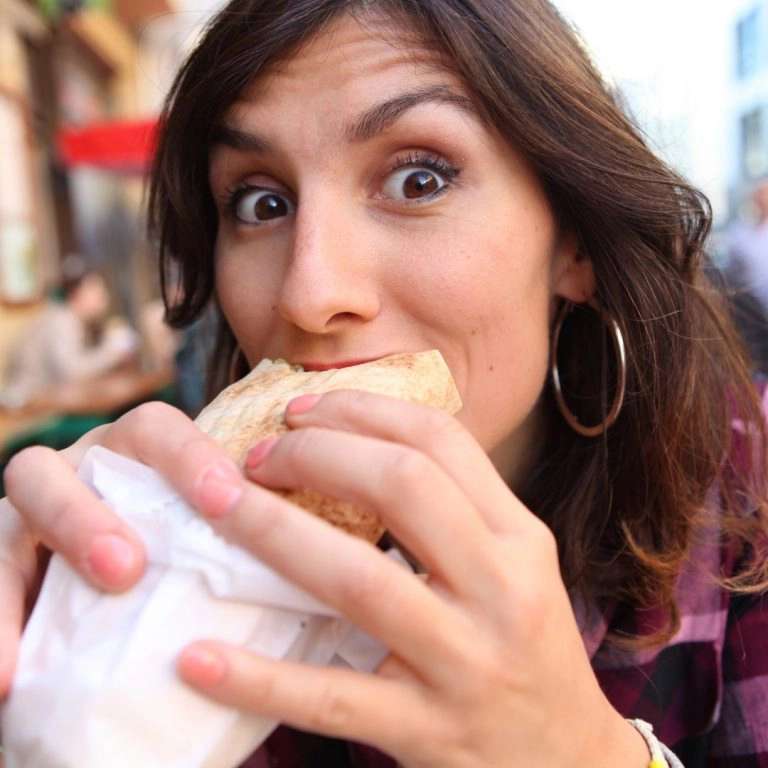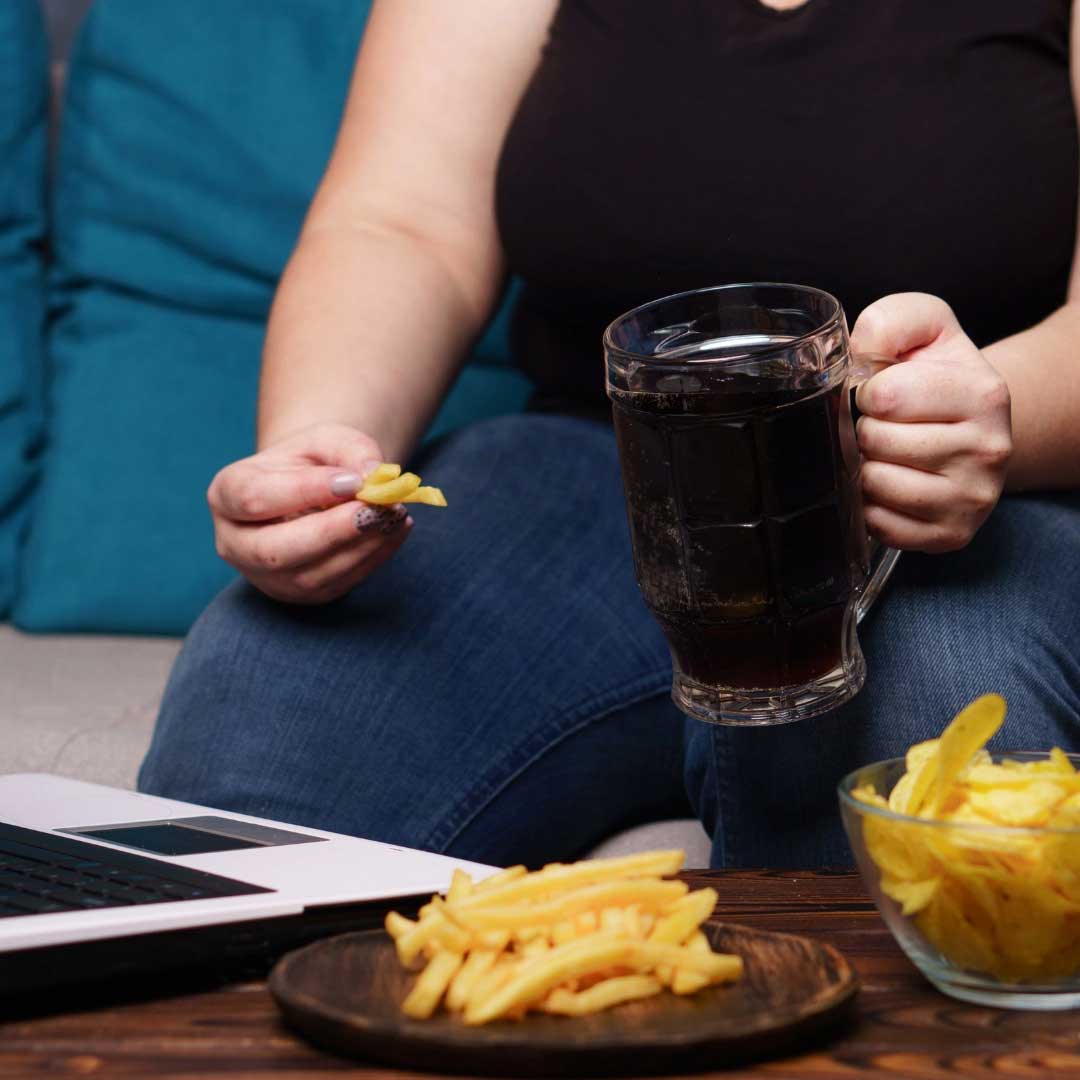Introduction
When it comes to better health, what we eat and drink – and choose not to – matters, but so do our behaviors.
Our eating habits and mealtime behaviors have a significant impact on our digestive health, digestive function, and ultimately our overall nutritional status and wellbeing” says Alicia Galvin RD and Erin Skinner RD, co-founders of the SIBO Academy.
How you eat matters and can have a huge impact on your health! So what type of eater are you?
Type Of Eater: The Chewer

Are you one of those people that swallows everything whole or do you chew, chew, chew your food, and are always the last one at the dinner table?
Chewing is the first step of digestion and will help break down food into easier-to-digest pieces so the rest of your body gets what it needs and you support optimal elimination.
It may even help to reduce the chance of food sensitivities. Depending on the food, try to chew each bite ~30x.
If you are the first person to finish a meal: work on slowing down, chewing, and eating to really taste your food. If you are always the last person to finish a meal: this could be completely fine and a sign of good chewing and mealtime behaviors!
But consider seeking guidance from your clinician if slow eating is related to any dental issues, low saliva production, digestion, distractions when eating, or anxiety around mealtimes.
Type Of Eater: The Mindless Eater

Do you sit in from of the TV eating chips straight out of the bag while you binge-watch Netflix night after night? Does breakfast consist of an Egg McMuffin and coffee as you drive mindlessly to work in the morning?
Putting utensils down, eating while standing/at your desk/in the car: we call this “distracted” or “mindless” eating. It doesn’t allow our vagal nerve to work well which impacts signals for optimal digestive function and may mean you feel less full.
How can you break free of this unhealthy routine? Start by reducing this habit by 1 meal a week. Studies show keeping the evidence of what you’ve eaten in front of you helps i.e leave all the plates you’ve used at a buffet in front of you.
Try putting your phone down, turning off the TV, and stepping away from your laptop to focus more on the textures and flavors of your food so you can enjoy a meal for a change.
Type Of Eater: The Fast Eater

Do you speed through your meals like your running a race and have to be the first one to leave the table? Then, slow down! Most Americans eat too fast and take in way too many calories before they even realize what’s happening. What does this lead to — you guessed it, weight gain!
It takes about 20 minutes for your brain to signal your body you’re full. Enjoying a leisurely meal gives you plenty of time to realize you’re full so you end up eating less and taking in fewer calories.
If you have problems slowing your eating pace try these easy tips:
- Put your fork down after each mouthful.
- Don’t eat in front of the TV, laptop, or smartphone.
- Take small bites of food.
- Sip on water during your meal.
- Eat high-fiber foods which are more filling.
- Be mindful and pay attention to what you’re eating.
Type Of Eater: The Clean My Plate Eater

Did your mom always tell you to clean your plate at every meal? Unfortunately, this practice can lead to overeating and ultimately weight gain. But, remember: it’s okay to leave food on your plate and it’s even ok to throw food away in the trash — the food police won’t take you away!
If eating to over-fullness, place your utensils down for 2-3 min when you start to feel full. Take a few deep breaths and allow your fullness to cue whether you are still hungry or not. Consider waiting 10-15 minutes before choosing another serving.
Type Of Eater: The Stuck In A Rut Eater

Variety is the spice of life — and mealtime is no exception. Do you eat the same foods for breakfast, lunch, and dinner every day of the week? This can get boring really fast, right?
If you tend to eat the same foods over and over, work on variety. The more diverse plant-based food you eat, the more diverse and robust your gut microbiome is, which is very important for overall health.
A recent study found that a lower diversity of gut bacteria may be associated with obesity and increased abdominal fat. Try mixing it up a bit — eating variety at meals helps you get all the health benefits of the rainbow-colored foods and not miss out on important nutrients in your diet.
Type Of Eater: The Snacker

Constantly snacking? Our body needs time when it isn’t trying to handle anything new so that it can digest, absorb, and eliminate effectively. You will want to identify – and ask your practitioner for help – the reason(s) you are snacking often.
Is the nutrient balance of your meal not satisfying you? Consider checking your meals and snacks to see if they contain quality fat, protein, carbohydrate, and non-starchy vegetables. Are you thirsty and not meeting your water needs? You could be confusing thirst cues for hunger ones.
What about your environment? Are there unhealthy snacks just sitting around? These may be triggering an appetite cue vs true hunger (even looking at Instagram and TikTok can do this!) so try to make your environment less tempting.
Also, consider your emotions when you snack; keep a log of when you snack and how you felt at that time. Could you be emotionally snacking instead of eating for hunger? If you have periods of bingeing, consider seeing a nutrition professional for support.
Finally, metabolic health plays a role in cravings and hunger. Ask a nutrition professional for help with investigating whether you may have metabolic dysregulation that impacts your snacking habits.
Conclusion
Whatever type of eater you are – too fast, too slow, mindless, same thing every day, or a snacker — being aware of how you eat is the first step to improving your eating habits.
Evaluating your current eating habits helps determine which are helping your body run better and where you need to focus your efforts to improve habits for better results.
If you need a little help with this, ask me about my free Eating Habits Evaluation to get a better idea of how you’re doing. Leave a comment and let me know what type of eater you are!
***Disclaimer: This post is for informational purposes only and should not be construed as medical advice***

